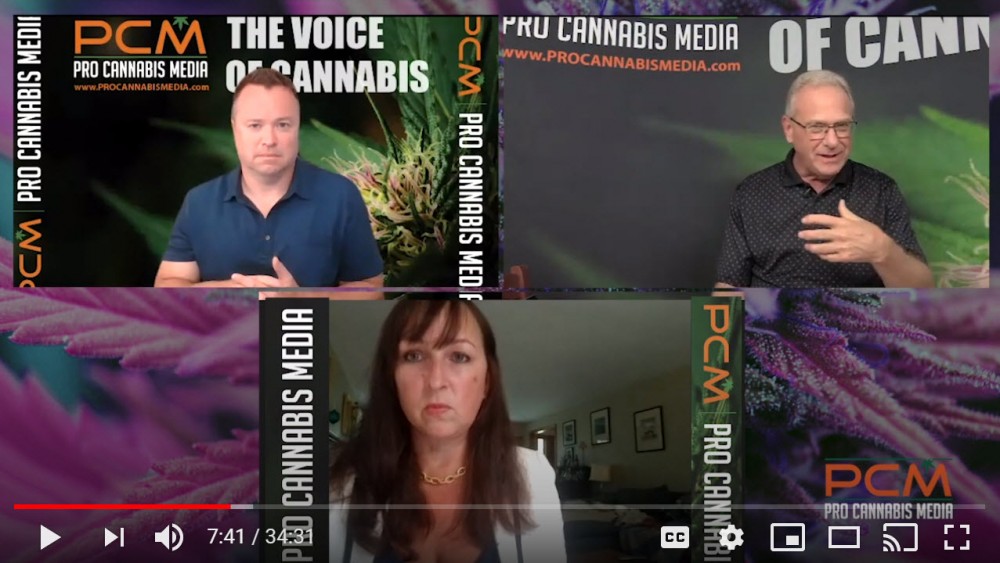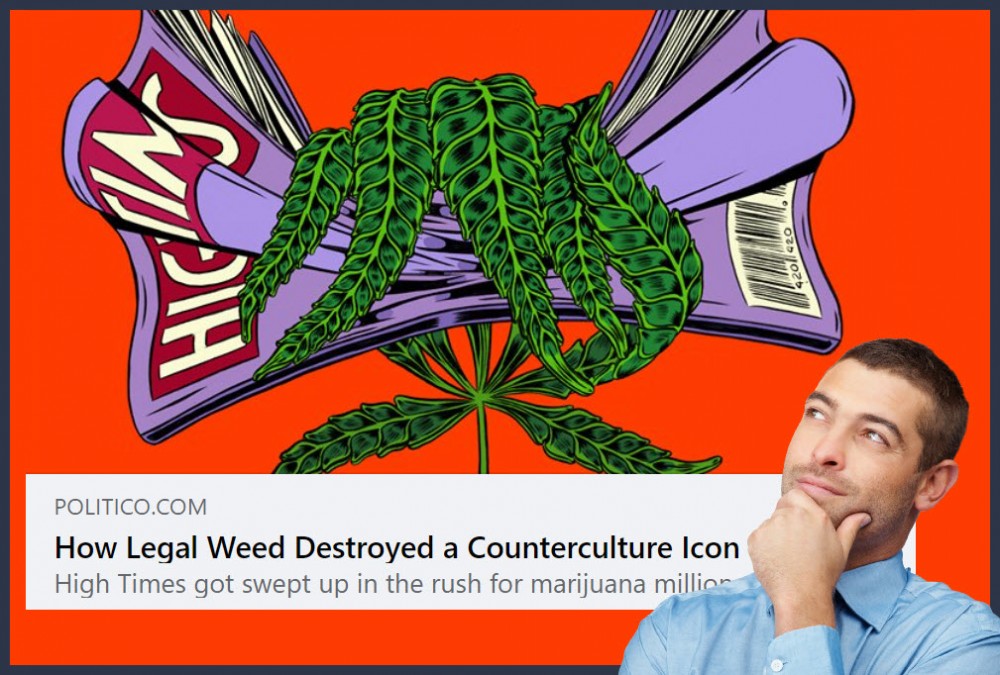High Times IPO - Sorry, No Refunds - Teri Buhl of Cannabis Law Reports Talks Reg A
Teri Buhl from Cannabis Law Reports has been a tenacious journalist for decades. In 2008 when she was writing for the New York Post, she was one of the first reporters to identify the illegal dealings by IndyMac. She protects her sources, and has earned a reputation as a "Smashmouth Journalist", a title she proudly trademarked. She is leading the reporting on recent deals with High Times. Now, that has led to the SEC shutting down their IPO efforts for the time being. Curt Dalton of Cannabis.net, and Jimmy Young of Pro Cannabis Media talk to her on a special edition of Weed Talk Now.
Dirty Dealings - The High Times IPO Saga Explained with Teri Buhl on Pro Cannabis Media from CannabisNet on Vimeo.
Jimmy Young:
Hi, everyone. Welcome to another very special edition of Weed Talk Now. I'm Jimmy young, the founder of Pro Cannabis Media.
Curt Dalton:
And I'm Curt Dalton, the founder of Cannabis.net.
Jimmy Young:
And we are so excited to welcome Teri Buhl to our program to talk about journalism, because this woman has been named one of the toughest journalists in the business when it comes to cannabis reporting. Teri, are you happy with Smashmouth Journalism?
Teri Buhl:
Yeah, I think it's great. Josh Brown, if you guys know Josh Brown from CNBC, he came up with that tagline for me. Then I think I went, we trademarked it. That's us.
Jimmy Young:
Well, congratulations on that. Your reputation certainly precedes you. I am very impressed with your résumé and what you did back in 2008, specifically.
Jimmy Young:
Here we are in 2020, and it looks like you might have a certain very impressive, very old brand in cannabis in your cross hairs. That would be Hightime. What is the latest right now on what's going on with Hightime since last week, when the SEC said, "You guys better stop your wheelings and dealings for an IPO."?
Teri Buhl:
Let's start back with the fact that Hightime still has never filed in the last year, their required annual report. This would be their cashflow, their balance sheet. It would be have an auditor audit their assets. So that Main Street, unsophisticated investors, could know what they're investing in in real time.
Teri Buhl:
The SEC actually told them all the way back, it was on June twelfth, because they missed the deadline, that they cannot accept investments anymore. You have to halt raising money. Adam Levin didn't do that. He didn't file an SEC filing telling anyone that they needed to do that. I found that alarming.
Teri Buhl:
When we got a tip, we went and asked their lawyers and they said, "Yes, it's true. We can't accept investments." And I go, "Well, why haven't you informed anyone of that?" And you know what they said? They said, "The SEC doesn't make us do it, so we don't think we need to do it."
Teri Buhl:
My editor, Sean Hocking, he was amazing, at Cannabis Law Report was like, "Teri, you have to report this right now. This is just a complete lack of transparency, and it's completely unfair for the Main Street investor trying to get into cannabis."
Teri Buhl:
In working on that reporting on that story, it took us a few days, and Adam's lawyers, you know, [Stephan Weiss 00:02:51], they did answer questions. But it was a consistent spin that they were doing a soft pause on the IPO. I called the SEC press office and they clearly explained. "No, we're telling you that you have to stop this. Isn't your choice. This isn't some huge design plan that Adam Levin has come up with." I was again once floored, I've seen Adam actually try to talk to Jeff Smith at MJ Biz and get him to tell a completely different side of the story. That's just not okay for the chairman of a company who's trying to become public.
Curt Dalton:
Teri, let me take a step back. What was the first moment where you raised an eyebrow, or you first came onto this Hightime scent? What was the initial, "Hmm, that's interesting,"? What did it for you?
Teri Buhl:
We actually broke a story three weeks ago, and it was another tip. We learned that the company had made a false statement in their SEC filings, when they said that Stormy Simon was still their chairman. The backstory is she probably called and complained, and they had to file another, what's called a 1-U form. Then they finally admitted, oh by the way, when she's left, she didn't stay on as chairman. That was our first [inaudible 00:04:08]. We're like, "What is happening here?" Once again, Hightime's lawyers said, "Well, the SEC doesn't have a problem with this."
Teri Buhl:
The next tip came and said, "Teri, call the SEC. I don't think that Hightimes is legally allowed to sell investments in his Reg A offering." Reg A offering is what we call mini IPO that they're trying to raise up to $50 million. That's what we did.
Curt Dalton:
Your followup to that was on Harvest Health. Can you tell us about a little bit about that deal and what you discovered?
Teri Buhl:
After that news broke, as always happens in investigative journalism, we got a lot more tips. We were suggested to try to look at the original merger agreement between a company called Have a Heart. These are dispensaries mainly through the State of Washington. There's two in California. And there were two in Iowa. Have a Heart's parent company would have been called Inter-Urban Capital Group.
Teri Buhl:
It was in March that Harvest Health announced an $80 million buyout of that entire company. Then, literally two months later, we see a letter of intent filed by Hightimes now and Harvest saying, "Okay well, we're actually going to buy the California assets of Have a Heart." Why that was contradictory is that Harvest had just been on an investor call telling people, when an analyst asked, "Why are you doing this deal?" They said, "Well, we want a stronger footprint in California." It didn't make sense that two months later they're getting rid of everything they just bought in California.
Teri Buhl:
It took some work, but I got someone to leak me their private merger document. From there, we definitely have a lot of anonymous sources in this story, but we were able to talk to some of the original social equity owners who would technically have done all the work to go to their local cities in Oakland, or San Francisco, or I think there's one in San Bernardino and secured ... And these are not unlimited ... secured the social equity license, so they could open a dispensary.
Teri Buhl:
We found out that ever since this deal, especially with Harvest and Inter-Urban Group, went down, nobody has paid rent. They just stopped paying rent on these dispensaries. Harvest just didn't, the entire time that they're trying to sell these assets to Adam Levin, they just stopped paying rent. Now, what that's critical is that a lot of the California cities, these licenses ... There's two stores that opened, so those are finally approved. But the other eight are not. Those licenses are contingent on one: You keep paying the rent. You help the local business owner. Number two: You have to show you're spending money on a build-out. That means physically making those store. It's got all kinds of regulations and standards that they have to do. If you stop doing that, we've seen other cities say, "Okay, you're not going to have this license. We're going to go and put this out for bid and someone else is going to get it."
Jimmy Young:
Can I ask you a little bit about Hightime?
Curt Dalton:
[crosstalk 00:07:25].
Jimmy Young:
Let me just ask about Hightimes, and how desperate is this company right now? They started in publishing. Then they went over to the events. Events got completely ... ended when COVID came around. Now, they're going after what a lot of people in this business want to do, which is control that seed-to-sale the vertical. They're trying to find verticals that they can buy into. But where is he getting the cash to do this? Is this all just monopoly money.
Teri Buhl:
Some of it, a lot of it is. But he has raised, at least Adam says he's raised 20 million. His SEC filing says he's raised 15. He does have some cash, such as the deal with Harvest. He only had to put down 1.5 million, and then give them $60 million in stock, for what I believe is just worthless assets right now. Because they didn't take care of the assets.
Teri Buhl:
Here's the story I always heard, and this is me speculating some. Adam, who is a VC, he's been with other companies that have gone public before, even though those definitely did not work out. I think it was [Bebo 00:08:41] Or [Beto 00:08:40]. He saw a cheap, or he thought it was cheap. He ended up paying way too much for it. He saw a cannabis company he could buy an IPO. That's all he thought about in 2017. It didn't matter to him if he overpaid for it. He just thought, "I'll have to just get stock, get my discounted stock, and get myself to NASDAQ."
Teri Buhl:
Well, guess what? NASDAQ wouldn't let him list. He couldn't get enough ... You need a certain amount of shareholders to be listed on NASDAQ. He couldn't pull that off. He had to go to plan B, which is try to list through a mini IPO gathering money, I think it said the minimum investment is $550, from Main Street. From your average guy who's going to go and buy your cannabis flower in a store, and he's excited about all these new opportunities in the business, and wants to be a part of this movement.
Teri Buhl:
Except he can't do it. He's been doing this for two years. I wrote about Reg A offerings, so before they started a company called a Growth Capitalist Investor. We wrote about the legislation. We watched every new IPO happen. We watched every money get raised in things like electric cars. It's hard to raise 50 million. No one has raised 50 million yet. I think. I think his goal was unrealistic also. Actually, 15 or 20 million raised from a group of Main Street investors. That's actually considered a good Reg A offering.
Teri Buhl:
He's been buying, and buying, and buying with his shares. These are preferred shares. Keep in mind that he calls these the "good shares", while your average investor in the Reg A offering gets the "bad shares". He gives the "good shares" to mom-and-pop startup companies that want their exit strategy. They want to get out. But we have no idea if those shares are ever going to trade.
Jimmy Young:
Got you.
Curt Dalton:
Do you think they will? That was my next question. Do you think there'll ever be a tradable share, because giving them away like their monopoly money, was that ever really in his plan? I've-
Teri Buhl:
I think yes. I think he does plan to list. It's not too hard to get listed on the OTC markets, unfortunately. You have to have a certain ... Really, I think it's the OTC QB, there's even one level below that, which he could try to list on. It doesn't get as much coverage, investors don't trust it as much, but he can list. He has enough shareholders to list right now.
Jimmy Young:
[crosstalk 00:11:13].
Teri Buhl:
This to me is more of a game that he wants to get as many unsophisticated investors in as he can right now, before he actually has to file a 2019 annual audited report. Because I think when we see that, Curt, as you've talked about before, the amount of debt that is going to be on there, the complete lack of cashflow, is going to be alarming. I think someone would rather go outside and burn their dollar bills with their joint than invest in Hightimes.

Curt Dalton:
Let me ask you, I've talked to Hightimes about ... Their original offering was as a events company, and now it's transitioned to a plant touching company. I brought up the conversation with them when I had it, is there some sort of refund or give-back policy? Because investors who did the first six or eight months were pitched A, and that was a completely looking different company. Maybe someone in Texas says, "Oh, I don't want to be touching the plant right now." They were going to have to look into it-
Teri Buhl:
So with all Reg A offerings, I looked at that language, unfortunately, no. They have the leeway, as most of them do, to do whatever they want with your money. I did speak with actually two investors last week after they read my story, they wanted to get out, and they showed me the emails they sent and the response from Hightime's Investor Relations. It said, "No, your investment's gone through. We're not giving you your money back. But hey, guess what? We'll have our financials filed by September 30th, and we'll definitely list by the fourth quarter." Now this is probably the third or fourth time these investors have heard this, though.
Jimmy Young:
I would think that they're losing their patience.
Curt Dalton:
Buyer's remorse.
Jimmy Young:
Yeah.
Curt Dalton:
And there's nothing they can do right now.
Jimmy Young:
Teri, let me ask you a question about the industry itself. There are a lot of multi-state operators out there that are using social equity applicants as, I don't want to use the word tools, but as figure heads. Isn't this another thing that Hightimes is trying to accomplish here?
Teri Buhl:
But that would be more go back to Inter-Urban Group and Have a Heart, who got the license in the first place. Now, the social equity owners I interviewed, no, they want to run a business. They did put them on as CEOs, but they are very involved, and ready to step in and do their job. They were just happy that someone else came along with the rest of the money to help do the build-out and move forward.
Teri Buhl:
They're hoping for a real business. I think they just lost it. The risk is that this license is going to go back to the city, like with Oakland. Or with what's happening with Alexis, he was a gentleman who had the Union Square store, if you seen his name in a lot of articles, because he is the one person who's gone on the record and spoken out. That was an incredible location. I learned it took them two years to get zoning for that. They had to fight Chanel because they didn't want a cannabis store on Gary Street. That license is going to go back to the city and he gets to reapply.
Jimmy Young:
Can I talk a little bit about valuations of-
Teri Buhl:
[crosstalk 00:14:33].
Jimmy Young:
Can we talk a little bit about valuations of companies. Valuations, to me, is a lot of made up ... How are they valuing each one of these companies that they're going after or trying to make deals with it? It always seems to be almost like, "Let's pick this number, let's pick that number." How did they come up with the value for the company when they get involved with that?
Teri Buhl:
I tried to get Harvest and Hightimes to admit that. I was able to actually get what's called a capitalization table. I have a copy of what a man named Dan Ranier ... He's really the majority owner. He was the one who negotiated the deal for Have a Heart with Harvest. It really just looked like they made up a value.
Teri Buhl:
Let's take a look Inter-Urban Group, they did have 4 million in cash, and they were profitable. They had a net profit, I think it was either 3 or 4 million. That was it.
Jimmy Young:
So, 10 million.
Teri Buhl:
Then they had to hold on five locations ... Hold on. Five locations in Washington, two in California, two in Iowa. Nine working locations. Maybe what, you throw a million on for each of those, maybe 5 million. We're still not getting anywhere near $80 million. To me, this was like, let's just throw an enormous amount of stock at this, and then we can somehow verify that we're going to get to this number. I think that's wrong.
Jimmy Young:
Curt, you've been talking about that on pretty much every show. Whenever we bring up Hightimes, it's just like, stock here, stock there, right?
Teri Buhl:
[inaudible 00:16:15] cash flow. If it was $80 million in their cashflow was 4 million. That's 20 times. What were you ...?
Jimmy Young:
I don't know too many industries you can do that with, by the way.
Curt Dalton:
Maybe Zoom. What we're on right now. Maybe Zoom technology during COVID got that. That's about right.
Jimmy Young:
That's right.
Curt Dalton:
Let me as you-
Jimmy Young:
[crosstalk 00:16:33].
Teri Buhl:
There's something else important though I want to say. In the research, at first I thought maybe Adam just didn't want to spend the money, because we have no idea how much money he really has right now, and didn't do the due diligence to understand that a lot of these California licenses he was buying from Harvest are not operational. If you don't pay the rent and you could lose the license, and for the stores, this is in the SEC filings and it's in the private merger agreement I got, the one Oakland store that is working, by the way, there's another individual named Josh Chase who owns 51% of that. The merger documents that he doesn't have to sell. He didn't sell. He's in control of that store. I don't know what, Adam might get a smaller piece of the equity. But I don't think he's going to get a management contract, which is really the other business model that they have set up here. I think he knew that before June 23rd, when they closed that deal, based on my interviews. I think he knew full well he wasn't getting very much. Not $60 million worth as he put on his press release.
Curt Dalton:
What does this look like? What's your prediction six months from now? Nine months? What is Hightimes? Is it trading on a much lower exchange? Do they get there? What's your prediction in a crystal ball? 12 months?
Teri Buhl:
I think if they try to really list at the end of the quarter, they're going to try to come out a dollar. It's going to go down to, let's say, 25 cents. Everyone's going to try to flood and get out of that stock. Then they're going to have a bunch of worthless stock and a ton of debt for all these companies that they're trying to buy or said they have a letter of intent, and then they're going to get sued. Maybe the SEC will start to investigate because of the complete lack of disclosure on this deal.

Jimmy Young:
This is why investing in a law firm is probably the safest investment in the cannabis industry these days, at least I've been saying that. Because there's always going to be lawsuits. It seems that the cannabis industry is starting to pile up more and more of these cases of mismanagement, fiscal irresponsibility, and they never do any due diligence. They don't do any background checks and they're just making up figures. At some point, doesn't the-
Teri Buhl:
Or, Jimmy, they do, but they just pretend everything's fine and it's not. That's even more worrisome.
Teri Buhl:
Hightimes [crosstalk 00:19:12]-
Jimmy Young:
Does this all change-
Teri Buhl:
Hold on. Hightimes, Harvest, and Have a Heart have already been sued. They were recently sued by the Iowa landlord in New York State. It's quite possible that Thor Equities, who has the mega $200,000 a month lease that has been broken in Union Square is going to suit too.
Curt Dalton:
Speaking of legal, has Hightimes or any of their lawyers reached out to yourself, your editor, and put pressure on you to retract or take down [crosstalk 00:19:37]-
Teri Buhl:
Even before the reporting started, when I was simply asking questions about, I don't understand why you're not disclosing more about the fact that you've had to halt your IPO. It reminded me ... And then couldn't get a straight answer if they were actually still collecting investments, finalizing investments. They are allowed to still market, which is alarming, but they can still send out marketing materials and tell people about the offer. What they can't do is collect the investment. I said, this reminded me of a company called Medex. It was one of the first cannabis companies, they sold pesticide and they had some website or some newsletter that went public at least two years ago, and the SEC did halt them because they didn't file their financials on time and they were still collecting investments.
Teri Buhl:
Hightimes was furious that I was going to even compare them to that situation. They had a lawyer out of California send me a cease and desist before we'd even published. I talked it over with my editor and he said, "That's ridiculous. We stand by all our reporting." We went forward with that.
Teri Buhl:
We found out, since so many publications followed our story and used the same language as Hightimes has to halt the IPO, Adam personally, was on the phone with other editors and other owners of other businesses threatening them. Unfortunately, some of them did change their headlines and remove their stories, but he also had his lawyers trying to, once again, send out letters trying to stop free and accurate speech.
Jimmy Young:
You feel [crosstalk 00:21:14]-
Curt Dalton:
That sounds familiar [crosstalk 00:21:16]-
Teri Buhl:
I don't ever take down a story, ever. I've been here before. There's two different cannabis players who have tried to sue me in the past. They're always dropped. They just want to try to get through discovery and they always drop the case with prejudice eventually. If I report something, we stand by it.
Jimmy Young:
Nice. You brought up so many things, I'm overwhelmed with things I can talk to you about. But at some point, if we see federal legalization in 2021, '22, '23, whenever it happens and there's going to be more people trying to get into the now legal cannabis industry and take other companies public, the first ones in aren't exactly setting a great example, are they?
Teri Buhl:
No, but here's the thing. If you talk to ... there's a lawyer in the cannabis space, he was at a big law firm. Now he's at Hiller. His name is David Feldman. He's an amazing securities attorney. He wrote the first book on a Reg A offerings, and he educated me on this. We need federal approval. That way NASDAQ and the NYSC will accept these offerings. When they do that, then they have at least 50% more restrictions and accountability, because they would be fully reporting SEC, Securities and Exchange Commission, companies. Unlike almost every company we see goes to list on the Canadian Stock Exchange, which is the most loosey-goosey exchange I've ever seen in my life. They just want to collect listing fees. That exchange you actually don't ... When you do a merger deal, they got a law passed two years ago where you don't even have to disclose all of the individuals, or the hedge funds, or the family funds that are in on the merger deal that would get stuck. They said that's a privacy violation in Canada. I'm just like what?
Teri Buhl:
Everyone right now is on the CSE. The CSE is even easier than the Toronto Stock Exchange. I think that we would have a lot better mature companies, with better lawyers bringing them public, better auditors auditing their financial statements. And they often do audited quarterly reports.
Curt Dalton:
Let's switch it up-
Jimmy Young:
Who do we blame? Okay, Curt. Go ahead, Curt.
Curt Dalton:
We've come out of ... If you were put in charge of Hightimes and had to turn this thing around and make it a positive result, what could he do? What immediately could he pivot? What would you do if you were Adam and wanted to turn this thing into a positive result for people?
Teri Buhl:
Ethically, I would give back all the Main Street investors' money. Then I would go out and I would try to cancel all of my, he has way too many deals that he's got out there. I would take the one or two dispensary companies that actually have a valid license and have most of their physical buildings built out, and I would try to make those two businesses run, and I would keep the company private, and I would try to raise money through institutions or family offices.
Teri Buhl:
Then I would go and do a Reg A IPO. Once I've proven I have a real business and not a lot of letter of intents and maybe ideas.
Curt Dalton:
I think, when I had done that interview with Stormy when she was CEO, I always thought one of their advantages, compared to say, I know Tommy and [Cheech Marin 00:00:24:49] are going to get into the dispensary. We had men, men. Something they can pitch is, we have those Hightimes cup winners. If you wanted to try the best shatter or you wanted that special blue dream, and they could put a certain amount at every one of their dispensaries, that's a real hook for a first time-
Teri Buhl:
That would be amazing.
Curt Dalton:
[crosstalk 00:25:03]. I want to try the winner. I thought she was going that direction. That's actually something that would make a difference in say, dispensary, A, B, and Can. Oh, cool. Shatter from this year's winner. I can go buy it at a Hightimes dispensary as opposed to somewhere else.
Teri Buhl:
Which would be amazing, but that's going to need capital, Curt. They would have to raise that to execute that business plan.
Jimmy Young:
One of the things you brought up was, what is Adam's net worth? How can you find out what a private person has for net worth in order to find out, is that where he's getting his money, or how much money does this guy really have? Can you get at his taxes?
Teri Buhl:
[crosstalk 00:25:46] I wish. I don't believe I could ever get a straight out of Adam, so if I asked him directly, I don't think he would tell me the truth, unfortunately.
Jimmy Young:
No, I don't think he would either.
Teri Buhl:
I have [crosstalk 00:25:52], but he has a proven track record of using stock, using marketing and promotional campaigns to allow that stock to grow, or create a perception in the market, and then selling the business at an advantage to him while the new buyers are left with not very much. That's not illegal. That is capitalism at its finest. I have no idea. I know the last interview he did in December, which is ironic, he's got some vacation home with it's a half-brother or stepbrother. They're off living in Puerto Rico right now.
Jimmy Young:
Why is that?
Teri Buhl:
We do know Puerto Rico has, what, zero income tax or something. The tax advantage you could get, if you still want to pretend to be a United States citizen.
Curt Dalton:
If you were in Vegas right now and making odds for a year out, is it more probable Adam is facing serious scrutiny and jail time, or he walks away from this scot-free?
Teri Buhl:
Oh, I think he walks away scot-free, except for the civil lawsuits that are going to happen.
Jimmy Young:
Is the cannabis industry, as it is right now, are we going to see improvements in their business practices if this goes legal, or are we going to still see more shady deals like we've been seeing over the first few years?
Teri Buhl:
I think that with any startup business, it's just going through growing pains, so that's going to take the market holding them accountable. You do that by not buying their stock and not investing in their company if they don't give you transparent financials and information, and don't answer investors questions, and allow you to check their backgrounds. It doesn't the city ... I think all of these cities check their backgrounds before they give a license, even though that's a private transaction. Why can't investors to see that information?
Curt Dalton:
Fair point.
Jimmy Young:
It's the host's security agreements in so many States that that takes up all that capital upfront. It's why people that have been most effected on the war on drugs can't get into this business, because they can't afford the upfront rent costs just to secure a location before they can even go and get their license. Isn't it the government and the-
Teri Buhl:
No, they need Wall Street money right now. That's true. Or angel investors, yeah.
Jimmy Young:
I think, Curt, we were talking to Bruce about this. Bruce [Barcot 00:28:29] from Leafly last night. Will there be a fund available through private investors that the social equity applicants can get their hands on in some capacity just to get them started? By the way, if I had the money, I'd give it to them, but I don't have that money. I don't know who does.
Teri Buhl:
That's a good question. I haven't seen a fund like that. They could be out there, but since it's private, one hasn't come off my radar. I wouldn't be surprised if they started though. The market is going to happen. It's going to grow. What are the estimates? In mega billions. Double-digit, is it triple-digit billions sometimes? That is all going to happen. I think there just has to be a shake out of good quality funds and high-net worth individuals trying to help cannabis entrepreneurs get started, and we can have a cleaner market.
Jimmy Young:
There you go.
Curt Dalton:
Excellent.
Jimmy Young:
Terrific.
Curt Dalton:
Teri, how can people contact you? What's the best way if they see this video, like you said, whether it's live or whether it's later, and they want to get quotes or learn more about what you're doing. What's the best way to reach you?
Curt Dalton:
Social media? Website?
Teri Buhl:
They should always go to Cannabis Law Report. My name and my face are right there in the center if they want to read my reporting.
Teri Buhl:
Then they can find me on Buhl B-U-H-L Reports, that's my Twitter handle. I also have my own publication, TeriBuhl.com, which covers stock fraud or Wall Street fraud in any industry. I always take anonymous tips at TeriBuhl@Gmail. That's T-E-R-I-B-U-H-L@gmail.
Jimmy Young:
Well, we put that up on the screen. I did that due diligence on you. That's what earned you the respect that I have for you. Once I found out what you've been up to as a journalist. It's going to take people like you to really make a difference and get this industry buttoned up the way it needs to be, because of the opportunities, not just for greed in America and capitalism, but really to make the kind of change that this industry has an obligation to make.
Jimmy Young:
Do you think that the cannabis industry has this-
Teri Buhl:
[crosstalk 00:30:43] better reporting, Jimmy, and you're right. I saw the stories coming out, and this is why I was so glad to meet this Australian Sean Hocking, who owns Cannabis Law Report. He had worked at other large publications before and was just tired of the fluff stories to kowtow to advertisers, or anyone who was afraid to do investigative reporting.
Teri Buhl:
A lot of companies, you do have to have liability insurance, or make sure, I don't know, that you could handle a lawsuit. A lot of journalists aren't set up that way and then that's a shame. But there are larger publications like Bloomberg, The Wall Street Journal, The New York Times, Forbes. They could be assigning and Barron's actually has, since Bill Albert's been covering cannabis deals, and he's done a great job at Barron's. We need more larger companies who have that backing to be able to handle losing an advertiser or getting sued to go up against these companies right now. That's why I thought it was such a great place to switch into and start covering in the last year, because there's so much fraud. There's so much to report. I love it.
Jimmy Young:
There you go. Hey, you're doing a great job and I'm glad I am no longer a journalist. I am very happy being a talk show host. I want to make sure people understand that. There is a difference when you talk about this subject, as opposed to going out and doing all the work that you're doing, Teri. I do commend you for your work ethic on that. I wish you the best of luck in the future.
Jimmy Young:
I really appreciate you taking the time out and enlightening, not just me and Curt, but our audience as well. We will certainly find you online at the Cannabis Law Report and continue to really enjoy your work. Because that is probably one of the best compliments you can give a journalist is I really enjoy your work, and we do Teri.
Teri Buhl:
[crosstalk 00:32:44].
Jimmy Young:
Keep it up.
Jimmy Young:
For Curt Dalton from Cannabis.net. I'm Jimmy Young from Pro Cannabis Media. Remember, it's a whole new world of weed out there. Use it responsibly and keep it in the bank, people. Keep your money in the bank for now. Don't be throwing it around at some of these speculative opportunities. I don't know, that's just how I feel.
Jimmy Young:
Thanks for watching. Thanks for listening. We'll see you next time.
THE HIGH TIMES SAGA, READ MORE...
WAS HIGH TIMES DESTROYED BY BIG MARIJUANA? NO WAY?
OR..
WAS STORMY SIMON SET UP TO TAKE THE FALL AT HIGH TIMES?
OR..
DID THE SEC JUST END THE HIGH TIMES IPO? CLICK HERE.









